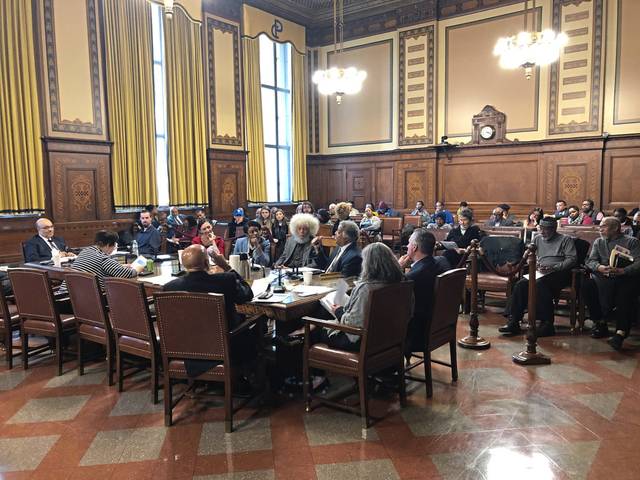https://triblive.com/local/pittsburgh-allegheny/racism-widespread-and-systematic-in-pittsburgh-experts-say/
Racism widespread and systemic in Pittsburgh, experts say

Racism is the fundamental cause of health disparities and other inequities in such areas as housing, employment and wealth accumulation that Pittsburgh black residents face daily, a group of experts told city council on Thursday.
Councilmen Ricky Burgess and R. Daniel Lavelle assembled the panel in an effort to push three proposed ordinances that would declare racism a public health crisis in the city, establish a leadership forum and create an investment fund to eliminate racial inequalities and barriers.
The meeting held in council chambers preceded a public hearing on the same issue scheduled for 6:30 p.m. at Ebenezer Missionary Baptist Church in the Hill District.
“This is not a black problem,” Lavelle said. “This is an American problem. This is a Pittsburgh problem. To fix this structural racist system is a benefit to all of us. We can fix that by (helping) the black and brown people who live in our city and lift them up.”
Government officials, local activists and researchers from the University of Pittsburgh offered striking examples of disparities between white and black city residents.
Forty-five percent of black children in Pittsburgh live in poverty compared to 8 percent of whites, according to LuAnn Brink of the Allegheny County Health Department. The city’s median household income is $56,000, but “just over” $30,000 for blacks, she said.
Cancer, diabetes and blood pressure rates are higher in the city’s black neighborhoods, according to health department statistics.
Noble A-W Maseru, a professor in Pitt’s School of Public Health, cited a survey that looked at mortality rates in 63 city neighborhoods. In predominantly black populated Larimer, the average life expectancy was age 62, compared to 84 in white dominated Highland Park, he said. The national average is 76, he said.
“Only nine of 63 neighborhoods in the city of Pittsburgh reach the national average of life expectancy,” Maseru said.
The numbers matched the “Pittsburgh’s Inequality Across Gender and Race” report released in September by the city’s Gender Equity Commission.
It found that 18 of every 1,000 pregnancies for black women in Pittsburgh end in fetal death, compared to nine of every 1,000 for white women and two of every 1,000 for other minorities. It found that more than one-third of black women live in poverty and are five times more likely to be poor than white men, and that black men are more segregated to certain jobs, compared to Pittsburgh’s white male workforce.
“Clearly all the work that’s been presented today demonstrates by leaps and bounds that we are in a crisis,” said Allegheny County Councilman DeWitt Walton.
Other council members pledged support.
“This white councilman from the South Hills is in full support of Councilmen Burgess and Lavelle,” said Anthony Coghill of Beechview.
Councilwoman Deb Gross of Highland Park said she was shocked at the poverty rate for black children.
“We need to hold ourselves accountable and the public should hold us accountable to see improvements,” she said. “We want to improve equity. It’s better for everyone in the city.”
Burgess predicted change would come slowly.
“This is the beginning of a years-long process of creating innovating policy that will drive resources to change our city,” he said. “We may disagree on how to help them, but we don’t disagree on who to help.”
Copyright ©2026— Trib Total Media, LLC (TribLIVE.com)
